8+ SAMPLE Quarantine Grocery List
-
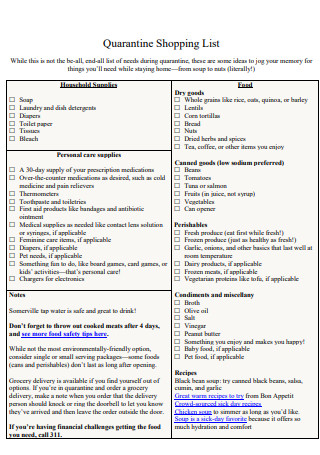
Quarantine Grocery Shopping List
download now -
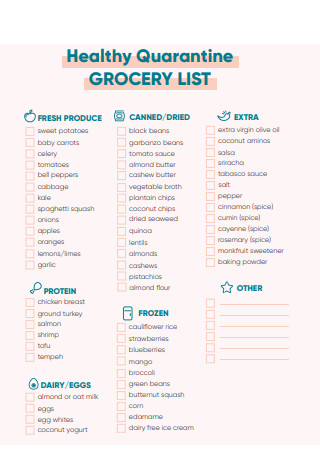
Healthy Quarantine Grocery List
download now -
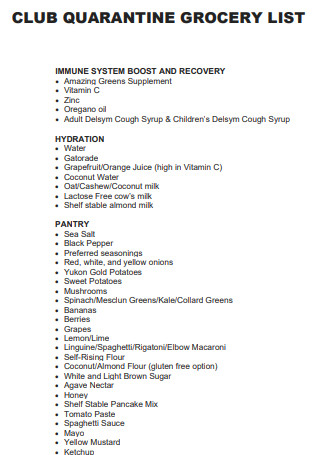
Club Quarantine Grocery List
download now -
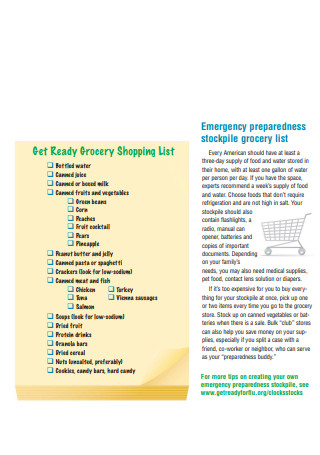
Emergency Quarantine Grocery Shopping List
download now -
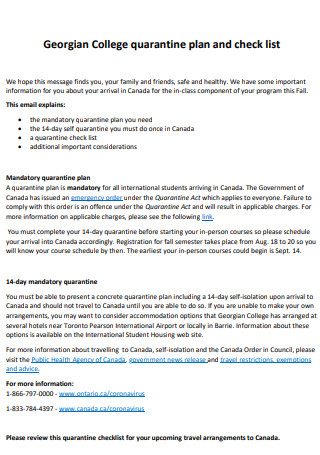
Quarantine Grocery Delivery Check List
download now -
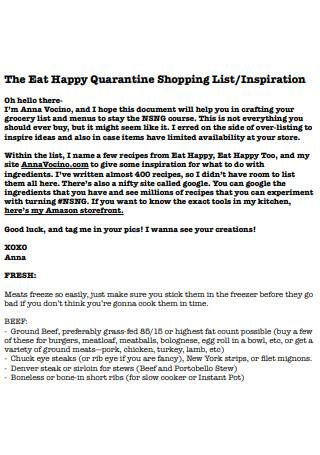
Quarantine Grocery Fresh Shopping List
download now -

Quarantine Grocery List
download now -
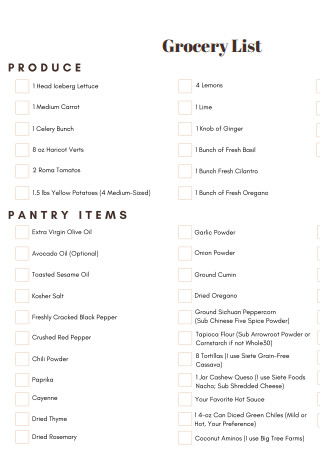
Quarantine Meal Plan Grocery List
download now -
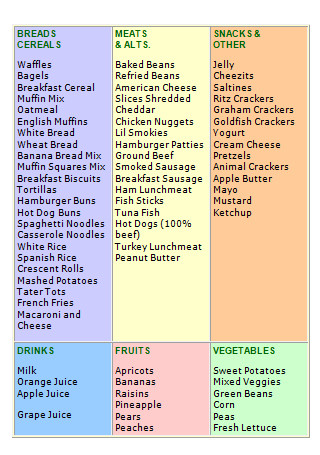
Quarantine Food Grocery List
download now
FREE Quarantine Grocery List s to Download
8+ SAMPLE Quarantine Grocery List
What Is a Quarantine Grocery List?
What Is a Quarantine?
What Is the Importance of Being on Quarantine?
What Do You Really Need on Hand to Make Sure You Are Prepared?
What to do During Quarantine Period?
FAQs
What are the long-lasting fruits and vegetables I should buy for Covid-19 quarantine?
How can one stay physically active during self-quarantine?
How to stay hydrated during self-quarantine?
Can Covid-19 be transmitted through food?
In what conditions does Covid-19 survive the longest?
What are the signs and symptoms of the coronavirus disease?
While some health professionals barely manage the health stability of their patients, it is every individual’s responsibility to do their basic parts in order to help prevent the spread of Covid-19.
What Is a Quarantine Grocery List?
A Quarantine Grocery List is when you take down notes of what you essentially need during quarantine period. It is a full list of what would help you maintain the stability of your health and/or recover from being sick. This consists of food with longer shelf life like canned and packaged foods. This also contains the recommended fruits and vegetables which helps regulate one’s general health. In addition, toiletries, any vitamins and other medication is also on the list.
What Is a Quarantine?
Quarantine is what helps protect the public by preventing exposure to people who have or may have a contagious disease. This separates and restricts the movement of people who were exposed to a contagious disease to see if they become sick. During this pandemic, people should quarantine after close contact with a person who is infected with coronavirus even if they have no symptoms or not vaccinated/boosted. For an additional information, close contact is when someone was within 6 feet of an infected person for a total of at least 15 minutes over a 24-hour period. Quarantining helps to keep people who might have been infected separate from others so they do not spread the virus.
What Is the Importance of Being on Quarantine?
The importance of quarantine is that it does not increase the number of Covid-19 cases any further. While governments and health authorities use quarantines to stop the spread of contagious diseases, quarantines are also for people or groups who do not have symptoms but were exposed to the disease. The quarantine keeps them away from others so they do not unknowingly infect anyone. Quarantines may be used during outbreaks which is a sudden rise in reported cases of a disease; during epidemics which is similar to outbreaks, but usually larger and more widespread and; pandemics which is a global epidemic, affecting hundreds of thousands or more people.
Aside from those suffering from Covid-19, people suspected or with confirmed exposure to those with Coronavirus have also been asked to self-quarantine. These quarantines are essential, even for world leaders—no one should be exempted.
Health experts recommend at least 14 days of isolation period for both exposed and infected cases. However, the choice to discontinue quarantine should be made on a case-by-case basis, and in consultation with a health professional and state and local health departments. The decision will be based on the risk of infecting others.
What Do You Really Need on Hand to Make Sure You Are Prepared?
Here are some suggestions for stocking up in the smartest and well-organized way:
What to do During Quarantine Period?
Step 1: Initiate Your Quarantine (if necessary or unless exempted)
You must quarantine or basically just stay at home and away from anyone. You can end your quarantine after Day 5 if you show no symptoms and you have a negative diagnostic test result that was collected on Day 5 or later.
Step 2: Get Tested
You should get tested immediately. If your test result is negative, you should get tested again on Day 5 after your last exposure. If either test result is positive, you must just isolate immediately.
Step 3: Monitor Your Health
Monitor your health for symptoms of Covid-19 for 10 days after your last exposure. If you begin to develop symptoms, you must isolate and test immediately. If your test result is positive, do continue to isolate. Your isolation period begins the day that your symptoms start. If your test result is negative, you can leave home once you have completed your quarantine period and you have been fever-free for the past 24 hours.
Step 4: Always Wear a Mask
Remember to wear a well-fitting mask while around others, indoors, and outdoors for 10 days after your last exposure. Adults should wear a well-fitting medical grade mask that is surgical or respirator. Children should wear a well-fitting, non-cloth mask of multiple layers of non-woven material with a nose wire.
Do not forget to eat and consume fiber because it contributes to a healthy digestive system and results a prolonged feeling of fullness, which helps prevent overeating.
To make sure an adequate fiber intake, aim to include vegetables, fruit, pulses, and wholegrain foods in all meals. Whole grain foods are the oats, brown pasta and rice, quinoa and whole-wheat bread and wraps, rather than refined grain foods such as white pasta and rice, and white bread.
Lastly, remember, good hydration is crucial for optimal health. Whenever available and safe for consumption, tap water is the healthiest and cheapest drink. It is also the most sustainable as it produces no waste, compared to bottled water.
FAQs
What are the long-lasting fruits and vegetables I should buy for Covid-19 quarantine?
The World Health Organization suggests consuming a minimum of 400 g or 5 portions of fruits and vegetables each day. Citrus fruits like oranges, clementine, and grapefruit are good options, as well as bananas and apples, which can also be cut into smaller pieces and frozen for consumption in the future or to add to smoothies. Moreover, root vegetables like carrots, beets and turnips, as well as vegetables like cabbage, broccoli, and cauliflower are relatively non-perishable items. Garlic, ginger, and onions are also great choices to keep at home, as they can be used to add flavor to a different kinds of meals.
How can one stay physically active during self-quarantine?
Take a walk. Even in small spaces, walking around or walking on the spot, can help you in being active. If you are having a call, just stand on your feet or walk around your home while you speak, instead of simply sitting down.
How to stay hydrated during self-quarantine?
Compared to bottled water, tap water is the healthiest and cheapest drink. It is also the most practical, as it produces no waste at all. Drinking water instead of sugar-sweetened drinks is a simple way to limit your intake of sugar and excess calories. To enhance its taste, fresh or frozen fruits like berries or slices of citrus fruits may be added, as well as cucumber or herbs such as mint, lavender or rosemary. These herbs also give healthy benefits and contribute to better immune system. It is advised to avoid drinking large amounts of strong coffee, strong tea, and especially caffeinated soft drinks and any energy drinks because these may lead to dehydration and can negatively impact the sleeping patterns of a person.
Can Covid-19 be transmitted through food?
Currently, there is no evidence that people can get Covid-19 from food since the virus that causes Covid-19 can be killed at temperatures similar to that of other known viruses and bacteria found in food.
In what conditions does Covid-19 survive the longest?
When exposed to the UV light in sunlight, coronaviruses die very quickly. Like other viruses, SARS-CoV-2 survives longest when the temperature is at room temperature or lower, and when the relative humidity is just low (<50%).
What are the signs and symptoms of the coronavirus disease?
Signs and symptoms include respiratory symptoms with fever, cough, and shortness of breath. In some critical cases, infection can cause pneumonia, severe acute respiratory syndrome, and oftentimes death. Standard recommendations to prevent the spread of Covid-19 involve frequent cleaning of hands using alcohol-based hand rub or soap and water; covering the nose and mouth with a flexed elbow or disposable tissue when coughing and sneezing; and avoiding close contact with anyone that has a fever and cough.
All across the globe, people are rushing to their local supermarkets to stock up on important non-perishables and household items. However, in the event that you do need to conduct a self-quarantine, or if you find yourself caring for someone who may have been exposed to coronavirus, it is a better idea to be ready by keeping enough nutritious foods in the house that will last for up to two weeks, at least.
Just an additional information that the new coronavirus is a rapidly spreading disease for which we have no natural immunity. Since there are vaccines available, anyone eligible is encouraged to get one. However, it is still possible that you can contract or transmit the virus even after being vaccinated so, one of the best ways to slow or stop the pandemic is to separate people through quarantine, social distancing, or isolation.
